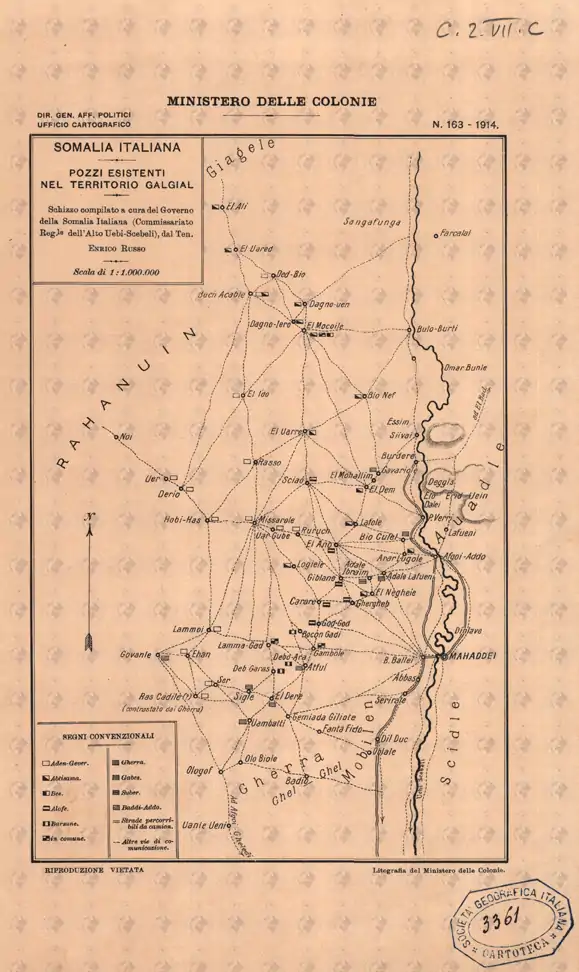Gaalje'el
The Gaalje'el (Somali: Gaaljecel), (Italian: Galgial) ,(Arabic: الجعل) Galjecel is one of the largest Somali clans, whose origins trace back to Gardhere. The Galje'el clan belong to the Saransor family of clans, alongside the Issa, Masare and Degodia.
Gaaljecel | |
|---|---|
| Total population | |
| 3,325,000 | |
| Languages | |
| Somali | |
| Religion | |
| Islam (Sunni) | |
| Related ethnic groups | |
| Garre, Degoodi, other Somalis |
Etymology
According to Ali Jimale, the etymology of the name Gaalje'el is from gaal, meaning camel and je'el meaning love: gaalje'el meaning "that which loves the camel". Gaal is the Af May (Reewin dialect) equivalent of Geel in Af Maḥa Tiri (the Maḥa Tiri dialect).[1]
Another etymology, which has recently gained steam, references the Jaalin tribe of Sudan. By combining "Geel", the dromedory camel for which the tribe is known to rear, with the arabic Al Je'el (الجعل), proponents of this etymology point to the bedouin nature of the Gaalje'el and surmise that the tribe could have had its origins in the nearby country, since they share the names of several branches.
Distribution
 The Gaalje'el traditionally settled in the region called Qorahsin of Hiraan, Lower Shabelle, Middle Shabelle These regions are called Qorahsin because it is located west of the Shabelle River,
and also inhabit in Jubaland,the city of Kismayo the largest rural community is Gaaljecel.
.[2]
The Gaalje'el are often incorrectly associated with the Hawiye clan due to their close political and social alignment. However, the Gaalje'el actually descend from Saransoor, as do the Degoodi, Masarre and the Iise. This means that there is no closer blood relation than beyond those also shared amongst all Somalis.[3]
The Gaalje'el traditionally settled in the region called Qorahsin of Hiraan, Lower Shabelle, Middle Shabelle These regions are called Qorahsin because it is located west of the Shabelle River,
and also inhabit in Jubaland,the city of Kismayo the largest rural community is Gaaljecel.
.[2]
The Gaalje'el are often incorrectly associated with the Hawiye clan due to their close political and social alignment. However, the Gaalje'el actually descend from Saransoor, as do the Degoodi, Masarre and the Iise. This means that there is no closer blood relation than beyond those also shared amongst all Somalis.[3]
Lineage
Gaalje'el is descended from Saransoor[4] Saransoor has 4 son's,[5] together with their uncle Garjante they are division of Larger Gardheere Samaale clans.
The Gaalje'el are often incorrectly associated with the Hawiye clan due to their close political alignment. However, there is no closer relation shared by the two tribes beyond that which is common to all Somalis. [6]
Clan tree
Max Planck Institute for Social Anthropology highlights some of the more prominent families which make up the Gaalje'el[7]
Gaalje'el
- Barsame
- Mugurmal
- Hadowe
- Mahamed Hassan
- Dumal Ja'eer
- Yabar Dumal
- Hassan Dumal
- Ali Dumal
- Soranle
- Mu'Awiya
- Arwaq (Doqondid)
- Ilkole
- Zubeir
- Mujaber
- Idris
- Dholadhaqan
- Erdhanli
- Dirisame
- Gargelis
- Wasuge
- Dorwaq
- Abtisame
- Jidfafah
- Baile
- Shige
- Haji Saleh
- Abki Alin
- Dumal Weyn
- Erabale (Reer Ugas)
- Yibadhale
- Jidfafah
- Millah
- Lahube
- Bes Lahube
- Omar Lahube
- Makahil
- Ali Makahil
- Yabar Makahil
- Makahil
- Alofi Lahube
- Kabole Alofi
- Bila Alofi
- Yabar Alofi
- Abtisame
- Dirisame
- Erdhanli
Notable figures
- Amina Mohamed Abdi, Somali Politician, and Member of Somali Parliament (MP) in the House of Representatives
- Sheikh Hassan Barsane, cleric who led a revolt against Italian colonial forces after World War I.
- Omar Faruk Osman, Somali journalist and trade unionist who is the General Secretary of the Federation of Somali Trade Unions (FESTU).
- Abdihakim Luqman, first Speaker Of Hirshabelle Parliament
- Fawziya Abikar Nur, Federal Minister for Health and Social Care in Somalia since March 2017.
- Ugas Abdullahi Ugas, is the govenor of galje’el clans since 2012.
References
- Ahmed, Ali Jimale (1 January 1995). The Invention of Somalia. The Red Sea Press. p. 96. ISBN 9780932415998.
- Max Planck Institute for Social Anthropology, Germany, Conflict analysis in Bakool and Bay, South-western Somalia https://www.eth.mpg.de/3709496/consultancy_report_mar_2004.pdf page 31.
- Max Planck Institute for Social Anthropology, Germany: "Conflict analysis in Bakool and Bay, South-western Somalia", March 2004: https://www.eth.mpg.de/3709496/consultancy_report_mar_2004.pdf
- Yuusuf, Muuse (20 May 2021). The Genesis of the Civil War in Somalia: The Impact of Foreign Military Intervention on the Conflict. Bloomsbury Publishing. ISBN 978-0-7556-2711-0.
- Maxamuud, Cabdulqaadir Cusmaan (1999). Sababihii burburka Soomaaliya (in Somali). Percetankan Zafar. ISBN 978-0-9681259-1-5.
- Ahmed, Ali Jimale (1995). The Invention of Somalia. The Red Sea Press. ISBN 978-0-932415-99-8.
- Max Planck Institute for Social Anthropology, Germany, "Conflict analysis in Bakool and Bay, South-western Somalia", https://www.eth.mpg.de/3709496/consultancy_report_mar_2004.pdf page 32/31